英语中的各种时态
英语中的16种时态

英语中的16种时态英语时态分为16种,下面就为大家一一列举:1、一般现在时态:表示现在的状态,或者经常反复发生的动作或习惯。
例如:I am a student.我是一名学生。
2、现在进行时态:表示正在进行的动作或存在的状态。
例如:He is studying.他在学习。
3、现在完成时态:表示过去发生的动作对现在造成的影响或结果。
例如:I have finished my homework.我已经完成了我的作业。
4、现在完成进行时态:表示从过去开始一直持续到现在的动作或状态。
例如:We have been waiting for you for hours.我们已经等了你几个小时了。
5、过去一般时态:表示过去某个时间点的状态或动作。
例如:He wasa teacher.他是一名老师。
6、过去进行时态:表示过去某个时间点正在进行的动作或存在的状态。
例如:They were playing football at that time.他们在那个时候正在踢足球。
7、过去完成时态:表示过去的过去,即过去某一时间之前发生的动作或状态。
例如:They had finished their work before we arrived.在我们到达之前,他们已经完成了他们的工作。
8、过去完成进行时态:表示过去某一时间之前一直在进行的动作或状态。
例如:We had been waiting for the bus for hours before it finally arrived.在公共汽车最终到达之前,我们已经等了好几个小时。
9、将来一般时态:表示将来某个时间点的状态或动作。
例如:She will be a doctor.她将成为一名医生。
10、将来进行时态:表示将来某个时间点正在进行的动作或存在的状态。
例如:We will be studying in the library tomorrow afternoon.我们明天下午将在图书馆学习。
英语中常见的六种时态的用法
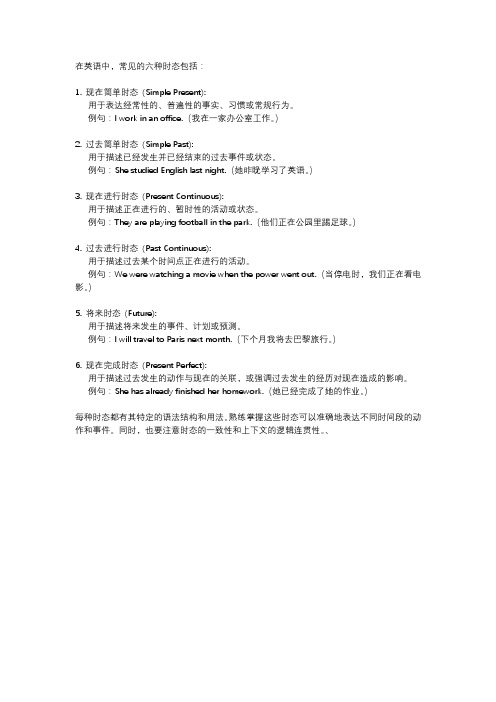
在英语中,常见的六种时态包括:1. 现在简单时态(Simple Present):用于表达经常性的、普遍性的事实、习惯或常规行为。
例句:I work in an office.(我在一家办公室工作。
)2. 过去简单时态(Simple Past):用于描述已经发生并已经结束的过去事件或状态。
例句:She studied English last night.(她昨晚学习了英语。
)3. 现在进行时态(Present Continuous):用于描述正在进行的、暂时性的活动或状态。
例句:They are playing football in the park.(他们正在公园里踢足球。
)4. 过去进行时态(Past Continuous):用于描述过去某个时间点正在进行的活动。
例句:We were watching a movie when the power went out.(当停电时,我们正在看电影。
)5. 将来时态(Future):用于描述将来发生的事件、计划或预测。
例句:I will travel to Paris next month.(下个月我将去巴黎旅行。
)6. 现在完成时态(Present Perfect):用于描述过去发生的动作与现在的关联,或强调过去发生的经历对现在造成的影响。
例句:She has already finished her homework.(她已经完成了她的作业。
)每种时态都有其特定的语法结构和用法。
熟练掌握这些时态可以准确地表达不同时间段的动作和事件。
同时,也要注意时态的一致性和上下文的逻辑连贯性。
、。
英语中的16种时态

英语中的16种时态1. 一般现在时(Simple Present):用于表示常规或经常性的动作、事实或真理。
2. 一般过去时(Simple Past):用于表示过去某个特定时间内发生的动作或事件。
3. 一般将来时(Simple Future):用于表示将来的计划、决定或预测。
4. 现在进行时(Present Continuous):用于表示现在正在进行的动作或临时性的情况。
5. 过去进行时(Past Continuous):用于表示过去某个时间点之前正在进行的动作。
6. 将来进行时(Future Continuous):用于表示将来某个时间点之前正在进行的动作。
7. 现在完成时(Present Perfect):用于表示与现在相关的过去动作或经验。
8. 过去完成时(Past Perfect):用于表示过去某个时间点之前的动作或事件。
9. 将来完成时(Future Perfect):用于表示将来某个时间点之前完成的动作。
10. 一般现在完成时(Present Perfect Continuous):用于表示从过去某个时间点开始一直持续到现在的动作或状态。
11. 一般过去完成时(Past Perfect Continuous):用于表示过去某个时间点之前一直持续的动作或状态。
12. 一般将来完成时(Future Perfect Continuous):用于表示将来某个时间点之前将持续的动作或状态。
13. 条件现在时(Present Conditional):用于表示与现在或将来相关的假设、条件或愿望。
14. 条件过去时(Past Conditional):用于表示与过去相关的假设、条件或愿望。
15. 虚拟现在时(Present Subjunctive):用于表示建议、请求、命令、要求或建立假设的情况。
16. 虚拟过去时(Past Subjunctive):用于表示与过去相关的虚拟情况,通常与虚拟条件句搭配使用。
英语八大时态总结
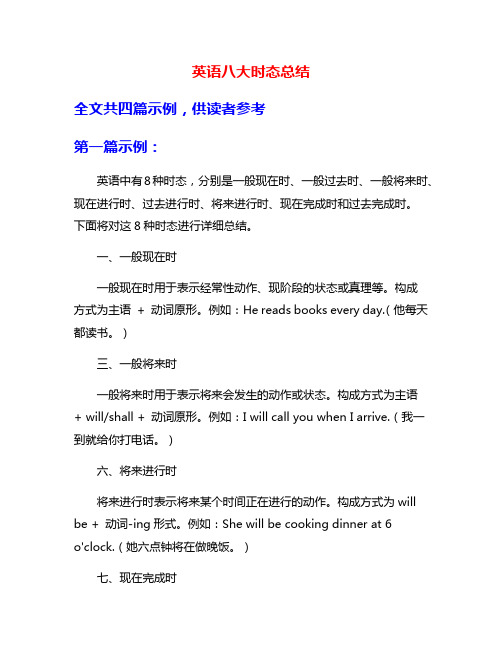
英语八大时态总结全文共四篇示例,供读者参考第一篇示例:英语中有8种时态,分别是一般现在时、一般过去时、一般将来时、现在进行时、过去进行时、将来进行时、现在完成时和过去完成时。
下面将对这8种时态进行详细总结。
一、一般现在时一般现在时用于表示经常性动作、现阶段的状态或真理等。
构成方式为主语+ 动词原形。
例如:He reads books every day.(他每天都读书。
)三、一般将来时一般将来时用于表示将来会发生的动作或状态。
构成方式为主语+ will/shall + 动词原形。
例如:I will call you when I arrive.(我一到就给你打电话。
)六、将来进行时将来进行时表示将来某个时间正在进行的动作。
构成方式为will be + 动词-ing形式。
例如:She will be cooking dinner at 6o'clock.(她六点钟将在做晚饭。
)七、现在完成时现在完成时用于表示过去某个时间开始的动作一直持续到现在,并可能继续发生。
构成方式为主语+ have/has + 过去分词。
例如:He has lived here for 5 years.(他在这里住了5年了。
)总结:1. 一般现在时表示经常性动作、现阶段的状态或真理。
2. 一般过去时表示过去某个时间发生的动作或状态。
3. 一般将来时表示将来会发生的动作或状态。
4. 现在进行时表示现在进行的动作或状态。
5. 过去进行时表示过去某个时间正在进行的动作。
6. 将来进行时表示将来某个时间将会进行的动作。
7. 现在完成时表示过去某个时间开始的动作一直持续到现在。
8. 过去完成时表示过去某个时间之前发生的动作。
掌握这8种时态的用法及构成方式对于学习英语语法和提高英语水平非常重要。
希望以上总结对您有所帮助。
第二篇示例:英语八大时态是学习英语语法非常重要的内容之一,掌握好各种时态的用法可以帮助我们更准确地表达自己的意思。
英语中的8大时态

英语中的8大时态1.一般现在时概念:表示经常发生的动作或经常存在的状态。
常和 always , often , usually , sometimes . every day 等表时间的状语连用。
如:1)主语+ be ( am / are / is )+...2)主语+实义动词/三单动词+...构成:1) Igo to school every day .我每天都去学校。
(表经常)2) He is always like that .他总是那样。
(表状态)2.现在进行时概念:表示现在(说话瞬间)正在进行或发生的动作。
如:1) He is singing .他正在唱歌。
2) They are watching TV now .他们正在看电视。
构成:主语+助动词 be ( am / are / is )+动词﹣ ing 形式构成3.一般将来时概念:表示将来某个时间要发生的动作或存在的状态,也表示将来经常或反复发生的动作,常与表示将来的时间状语连用,如: tomorrow ,next week , next year , in the future 。
如:1) He will go shopping tomorrow .他明天要去购物。
2) They are going to play basketball next week .他们下周要去打篮球。
构成:1)主语+助动词 will +动原+…2)主语+ be going to +动原+…4.一般过去时概念:1)表示过去某个时间发生的动作或存在的状态,常和表示过去的时间状语连用。
tday , lst eek , in 1998, two days ago 等。
如: I went to a movie yesterday .我昨天去看了一场电影。
2)也可表示过去经常或反复发生的动作。
如: He always went to work by bike last week .他上周总是骑车去上班。
英语中的十六种时态
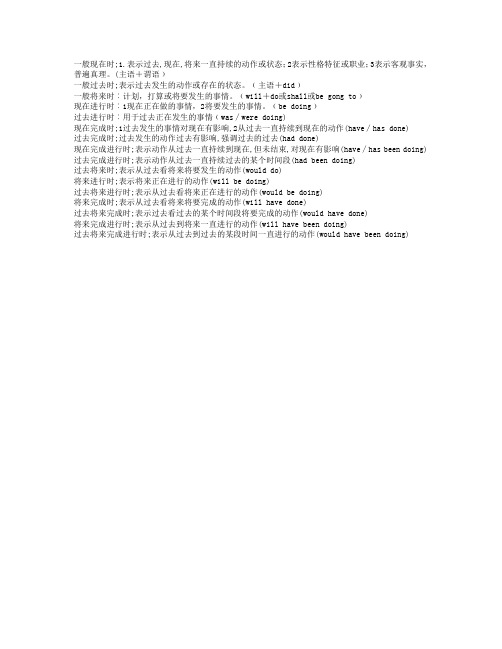
一般现在时;1.表示过去,现在,将来一直持续的动作或状态;2表示性格特征或职业;3表示客观事实,普遍真理。
(主语+谓语﹚
一般过去时;表示过去发生的动作或存在的状态。
﹙主语+did﹚
一般将来时︰计划,打算或将要发生的事情。
﹙will+do或shall或be gong to﹚
现在进行时︰1现在正在做的事情,2将要发生的事情。
﹙be doing﹚
过去进行时︰用于过去正在发生的事情﹙was∕were doing)
现在完成时;1过去发生的事情对现在有影响,2从过去一直持续到现在的动作(have∕has done)
过去完成时;过去发生的动作过去有影响,强调过去的过去(had done)
现在完成进行时;表示动作从过去一直持续到现在,但未结束,对现在有影响(have∕has been doing) 过去完成进行时;表示动作从过去一直持续过去的某个时间段(had been doing)
过去将来时;表示从过去看将来将要发生的动作(would do)
将来进行时;表示将来正在进行的动作(will be doing)
过去将来进行时;表示从过去看将来正在进行的动作(would be doing)
将来完成时;表示从过去看将来将要完成的动作(will have done)
过去将来完成时;表示过去看过去的某个时间段将要完成的动作(would have done)
将来完成进行时;表示从过去到将来一直进行的动作(will have been doing)
过去将来完成进行时;表示从过去到过去的某段时间一直进行的动作(would have been doing)。
英语中的十六种时态

英语中的十六种时态一、一般现在时1.概念:表示经常发生的情况;有规律出现的情况;总是发生的;和事实真理2.时间状语: always, usually, often, sometimes, everyweek day,year, month…·, oncea weekday,year, month…, on Sundays on M ondays…·,3.基本结构:动词原形如主语为第三人称单数,动词上要改为第三人称单数形式4.否定形式:主语+am/is/are+not+其他;此时态的谓语动词若为行为动词,则在其前加don’t,如主语为第三人称单数,则用 doesn’t,同时还原行为动词;5.一般疑问句:把be动词放于句首;用助动词do提问,如主语为第三人称单数,则用does,同时,还原行为动词;6.例句: It seldom snows here.这里很少下雪; He is always ready to help others.他总是乐于帮助别人 Action speaks louder than words.事实胜于雄辩二、一般过去时1.概念:过去某个时间里发生的动作或状态;过去习惯性、经常性的动作、行为;2.时间状语:ago, yesterday, the day before yesterday, last week , last year , night , month . , in 1 9 8 9 , just now at the age of 5 , one day , long long ago , once upon a time3.基本结构:主语+动词的过去式或be的过去式+名词4.否定形式:主语+was/were+not+其他;在行为动词前加didn’'t,同时还原行为动词;5.一般疑问句:was或were放于句首;用助动词do的过去式did提问,同时还原行为动词;6.例句: She often came to help us in those days.那些天她经常来帮助我们; i didn' t know you were so busy.我不知道你是这么忙三、一般将来时1.概念:表示将要发生的动作或存在的状态及打算、计划或准备做某事;2时间状语: Tomorrow, next dayweek, month,year…· soon , in a few minutes , by , the day after tomorrow , etc .3.基本结构:主语+am/is/are+ going to+do+其它;主语+wi1l/ shall+do+其它4.否定形式:主语+am/is/ are not going to do;主语+will/ shall not do+其它5.一般疑问句:be放于句首;wi1l/sha1l提到句首;{首字母大写6 .例句 : they are going to have a competition with us in studies It is going to rain.天要下雨了四、一般过去将1.概念:立足于过去某一时刻,从过去看将来,常用于宾语从句中;2.时间状语: The next day morning \,year……,the following monthweek…·,etc3.基本结构:主语+Was/were+ going to+do+其它;主语+ would/ should+do+其它4.否定形式:主语+was/were+not+ going to+do;主语+ would/ should5.一般疑问句:was或were放于句首; would/ should提到句首6.例句: He said he would go to beijing the next day.他说他第二天要去北京; asked who was going there.我问,谁要去那里;五、现在进行时1.概念:表示现阶段或说话时正在进行的动作及行为;2时间状语:Now, at this time,days,, listen3.基本结构:主语+be+ doing+其它4.否定形式:主语+be+ not + doing+其它5.一般疑问句:把be动词放于句首;6.例句: How are you feeling today你今天感觉如何 He is doing well in his lessons.在课上他表现得很好;六、过去进行时1.概念:表示过去某段时间或某一时刻正在发生或进行的行为或动作;2时间状语: at this time yesterday, at that time或以when引导的谓语动词是一般过去时的时间状语等;3.基本结构主语+was/ were + doing+其它4.否定形式:主语+Was/were+not+ doing+其它5.一般疑问句:把was或were放于句首;第一个字母大写6.例句: At that time she was working in a pla unit.那段时间她在人民解放军部队工作; When he came in, i was reading a newspaper.他进来时,我正在读报纸;七、将来进行时1.概念:表示将来某一时间正在进行的动作,或表示要在将来某一时间开始,并继续下去的动作;常用来表示询问、请求等;2时间状语:Soon, tomorrow, this evening, on Sunday, by this time , in two days , tomorrow evening3.基本结构:主语+ shall/will+be+现在分词+其它4否定形式:主语+ shall/wi1l+not+be+现在分词+其它5.例句: This time next day they will be sitting in the cinema.下一天的这个时间,他们正坐在电影院; He won’ t be coming to the party.他不去参加聚会了;八、过去将来进1.概念:表示就过去某一时间而言,将来某一时刻或某一段时间正在进行的动作,主要用于宾语从句中,尤其多用于间接引语中2.基本结构: should/ would+be+现在分词3.例句: They said they would be coming他们说了他们将要来; He said he could not come because he would be having a meeting .他说他不能来因为要开会九、现在完成时1.概念:过去发生或已经完成的动作对现在造成的影响或结果,或从过去已经开始,持续到现在的动作或状态;2.时间状语:yet, already,just, never,ever, so far, by now,S1nce+时间点,for+时间段, recently, lately,ln the past few years , etc .3.基本结构:主语+have/has+过去分词+其它4.否定形式:主语+have/has+not+过去分词+其它5.一般疑问句:have或has放句首;6.例句: I've written an article.我已经写了一篇论文; The countryside has changed a lot in the past few years在过去的几年,农村发生了巨大的变化十、过去完成时1.概念:以过去某个时间为标准,在此以前发生的动作或行为,或在过去某动作之前完成的行为,即“过去的过去”;2时间状语: Before, by the end of last yearterm, month…·,etc.3.基本结构:主语+had+pp过去分词+其它4.否定形式:主语+had+not+过去分词+其它5.一般疑问句:had放于句首;6.例句: As soon as we got to the station, the train had left.当我们到车站的时候,火车已经开走了; By the end of last month , we had reviewed four books .到上个月底,我们已经复习了四本书;7.基本结构:主语+had+过去分词+其它①肯定句:主语+had+过去分词+其它②否定句:主语+had+not+过去分词+其它③一般疑问句:Had+主语+过去分词+其它④特殊疑问句:特殊疑问词+一般疑问句十一、将来完成时1.概念:在将来某一时刻之前开始的动作或状态2.时间状语: by the time of; by the end of+时间短语将来; by the time+从句将来3.基本结构:主语+ be going to/will/ shall+have+过去分词+其它4.例句:by the time you get back , great changes will have taken place in this area .到你回来的时候,就将发生巨大的变化;十二、过去将来完成时1.概念:表示在过去某一时间对将来某一时刻以前所会发生的动作,常用在虚拟语气中,表示与过去的事实相反;2.基本结构: should/ would have done sth3.例句: i thought you'’ d have left by this time.我想这会儿你已经走了; He told them he would have finished it by 8 o clock .他告诉他们他会在8点以前干完十三、现在完成进行时1概念:表示从过去某一时间开始一直延续到现在的动作;这一动作可能刚刚开始,也可能仍在继续,并可能延续到将来;2.基本结构:主语+have/has+been+ doing+其它3时间状语: Since+时间点,for+时间段等;4.例子: i have been sitting here for an hour.我已经在这里坐了一个小时; The children have been watching tv since six o ' clock .从6点起,孩子们一直看电视十四、过去完成进行时1.概念:表示某个正在进行的动作或状态,持续到过去某个时刻,还未完成,一直持续到之后的当前才结束;2.基本结构:主语+had+been+ doing+其它3.例子: She had been suffering from a bad cold when she took the exam;她在考试之前一直患重感冒; Had they been expecting the news for some time 他们期待这个消息有一段时间了吧4.特殊含义:①尚未完成: He had been writing the novel.他已经在写小说了;他没写完②企图: He had been studying the meaning of this proverb.他曾经学习过这个谚语;他曾努力学习过它③未得结果: We had been studying what our enemy had said.我们一直致力于敌人所说的;但是我们没有理解④最近情况: He had been quarreling with his wife.他和他的妻子吵了一场架;最近⑤反复动作: He had been asking me the same question.他一直问我相同的问题;屡次⑥情绪: What had he been doing他做了什么不耐烦十五、将来完成进行时1.概念:表示动作从某一时间开始一直延续到将来某一时间是否继续下去,要视上下文而定;2.基本结构: shall/ will have been doing3.例子:I shall have been working here in this factory for twenty years by the end of the year .到今年年底,我将在这个工厂工作20年了;If we don ' t hurry up the store will have been closing before we get there .咱们如不快一点儿,等我们到了那儿,店门就会关了;十六、过去将来完成进行时1.概念:表示从过去某时看至未来某时以前会一直在进行的动2.基本结构:should/ would+have+been+现在分词3.例子: He told me that by the end of the year he would have been living there for thirty years .他告诉我,到年底时,他就在那住了30年了;。
英语中的十六种时态
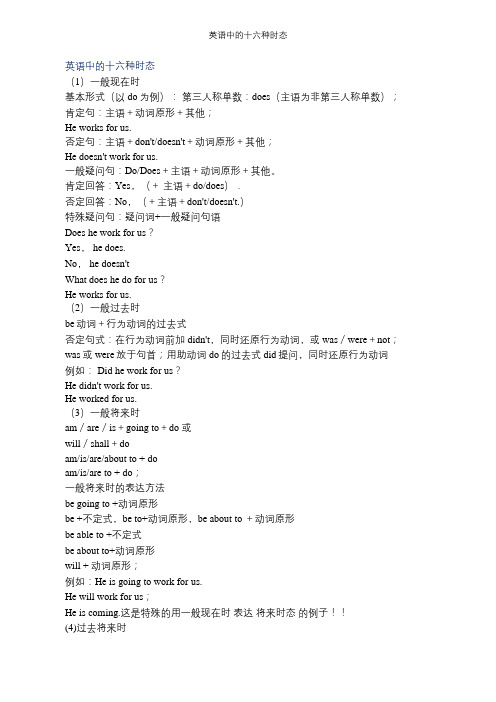
英语中的十六种时态(1)一般现在时基本形式(以do为例):第三人称单数:does(主语为非第三人称单数);肯定句:主语+动词原形+其他;He works for us.否定句:主语+don't/doesn't+动词原形+其他;He doesn't work for us.一般疑问句:Do/Does+主语+动词原形+其他。
肯定回答:Yes,(+主语+do/does).否定回答:No,(+主语+don't/doesn't.)特殊疑问句:疑问词+一般疑问句语Does he work for us?Yes, he does.No, he doesn'tWhat does he do for us?He works for us.(2)一般过去时be动词+行为动词的过去式否定句式:在行为动词前加didn't,同时还原行为动词,或was/were+not;was或were放于句首;用助动词do的过去式did提问,同时还原行为动词例如: Did he work for us?He didn't work for us.He worked for us.(3)一般将来时am/are/is+going to+do 或will/shall+doam/is/are/about to + doam/is/are to + do;一般将来时的表达方法be going to +动词原形be +不定式,be to+动词原形,be about to +动词原形be able to +不定式be about to+动词原形will + 动词原形;例如:He is going to work for us.He will work for us;He is coming.这是特殊的用一般现在时表达将来时态的例子!!(4)过去将来时be(was,were)going to+动词原形be(was,were)about to+动词原形be(was,were)to+动词原形肯定句:主语+be(was,were)going to+动词原形~.否定句:主语+be(was,were)not going to+动词原形~.疑问句:Be(Was,Were)+主语+going to+动词原形~?肯定句:主语+would(should)+动词原形~.否定句:主语+would(should)not+动词原形~.疑问句:Would(Should)+主语+动词原形~?He would work for us.(5)现在进行时主语+be+v.ing〔现在分词〕形式(其中v表示动词)表示现在正在进行的动作或最近在做的事。
英语中常见的时态有哪些

英语中常见的时态有哪些时态是英语语法中的重要概念,用于表达动作或状态发生的时间。
在英语中,常见的时态包括一般现在时、一般过去时、一般将来时、现在进行时、过去进行时、现在完成时、过去完成时、将来完成时等。
以下将逐一介绍这些时态的用法和例句。
一、一般现在时(Simple Present Tense)一般现在时用于表达经常性的动作、客观事实和现在的状态。
动词原形表示。
例句:1. He drinks coffee every morning.(他每天早上喝咖啡。
)2. The sun rises in the east.(太阳从东方升起。
)3. I live in New York.(我住在纽约。
)二、一般过去时(Simple Past Tense)一般过去时用于表达过去发生的动作或状态。
动词过去式表示。
例句:1. She visited her grandparents last weekend.(上周末她去看望了她的爷爷奶奶。
)2. They played basketball in the park yesterday.(他们昨天在公园打篮球。
)3. We went to the beach for a holiday.(我们去海滩度假了。
)三、一般将来时(Simple Future Tense)一般将来时用于表达将来要发生的动作或状态。
使用will或be going to加动词原形表示。
例句:1. I will meet you at the train station tomorrow.(明天我会在火车站见你。
)2. She is going to travel to Europe next month.(下个月她将去欧洲旅行。
)3. They will have a party on Friday.(他们星期五要开派对。
)四、现在进行时(Present Continuous Tense)现在进行时用于表达当前正在进行的动作。
英语中的16种时态详解

英语中的16种时态详解英语中有12种基本时态,分别是:1. 一般现在时(Simple Present Tense):表示经常性或普遍性的动作或状态,例如:I study English every day.(我每天学习英语。
)2. 现在进行时(Present Continuous Tense):表示正在进行的动作,例如:He is watching TV now.(他正在看电视。
)3. 一般过去时(Simple Past Tense):表示过去的某个时间发生的动作或状态,例如:I played soccer yesterday.(我昨天踢足球了。
)4. 过去进行时(Past Continuous Tense):表示过去某个时间正在进行的动作,例如:She was cooking dinner at 6 p.m. yesterday.(昨天下午6点她正在做晚餐。
)5. 现在完成时(Present Perfect Tense):表示过去发生的动作对现在产生的影响,例如:We have finished our homework.(我们已经完成作业了。
)6. 过去完成时(Past Perfect Tense):表示过去的某个时间发生的动作或状态在过去的某个时间之前已经完成,例如:She had washed the clothes before I arrived.(我到达之前她已经洗好衣服了。
)7. 将来时(Simple Future Tense):表示将来要发生的动作或情况,例如:We will go to the movies tomorrow.(我们明天将去看电影。
)8. 现在完成进行时(Present Perfect Continuous Tense):表示过去某个时间开始,一直持续到现在的动作,例如:He has been studying English for 3 hours.(他已经学习英语三个小时了。
英语中的十六种时态

精心整理英语中的十六种时态5.一般疑问句:was或were放于句首;用助动词do的过去式did提问,同时还原行为动词。
6.例句:Sheoftencametohelpusinthosedays.那些天她经常来帮助我们。
ididn'tknowyouweresobusy.我不知道你是这么忙三、一般将来时1.概念:表示将要发生的动作或存在的状态及打算、计划或准备做某事。
2时间状语:Tomorrow,nextday(week,month,year…·)soon,inafewminutes,by,thedayaftertomorrow,etc.3.基本结构:主语+am/is/are+goingto+do+其它;主语+wi1l/shall+do+其它4.否定形式:主语+am/is/arenotgoingtodo;主语+will/shallnotdo+其它5.一般疑问句:be放于句首;wi1l/sha1l提到句首。
{首字母大写6.例句:theyaregoingtohaveacompetitionwithusinstudiesItisgoingtorain.天要下雨了四、一般过去将1.概念:立足于过去某一时刻,从过去看将来,常用于宾语从句中。
2.时间状语:Thenextday(morning\,year……),thefollowingmonth(week…·),etc3.基本结构:主语+Was/were+goingto+do+其它;主语+would/should+do+其它4.否定形式:主语+was/were+not+goingto+do;主语+would/should5.一般疑问句:was或were放于句首;would/should提到句首6.例句:Hesaidhewouldgotobeijingthenextday.他说他第二天要去北京。
askedwhowasgoingthere.我问,谁要去那里。
常见九种英语时态

S has /have gone+地点here /there,表示去了某处(即不在这里、已离开)。
05
注:
examples
He hasn’t yet turned off the light. She has ever read this book. I’ll returned the book to you as soon as I have finished it. He has lived here since last summer. We have been here for 3 years. He has worked in the factory since last year/he came here. China has changed greatly in the past ten years . This is the first time that they have come here. He has been to Australia. He has gone to Australia.
have been +V-ing
V/ V3
V-ed
+will
+would
work works
am working is working are working
have worked has worked
have been working has been working
worked
was working were working
感知或感觉的动词:hear, see, seem, smell, sound, look, feel等。
表示心理或情感的动词:like, love, hate, prefer, wish等。
16种英语时态(经典收藏版)-太全了!
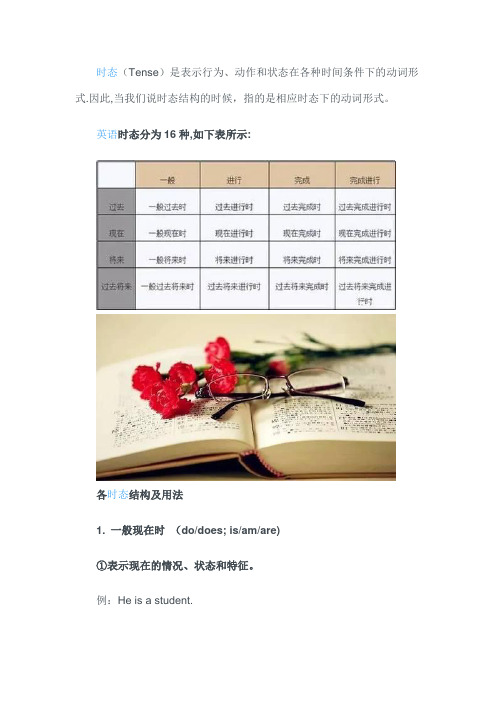
时态(Tense)是表示行为、动作和状态在各种时间条件下的动词形式.因此,当我们说时态结构的时候,指的是相应时态下的动词形式。
英语时态分为16种,如下表所示:各时态结构及用法1. 一般现在时(do/does; is/am/are)①表示现在的情况、状态和特征。
例:He is a student.他是一个学生.②表示经常性、习惯性动作。
例:He always helps others.他总是帮助别人.③客观事实和普遍真理。
例:The earth moves the sun.地球绕着太阳转.④表示一个按规定、计划或安排要发生的动作.(常用于列车、客车、飞机或轮船时刻表)例:The next train leaves at 3 o’clock this afternoon。
下一趟火车今天下午3点开车。
⑤主将从现:在时间、条件和让步状语从句中经常用一般现在表示将的来事情。
例:If it rains tomorrow, we will stay at home.如果明天下雨,我们会待在家里。
2。
现在进行时(am/is/are doing)①表示此时此刻正在发生的事情。
例:He is listning to the music now。
他现在正在听音乐。
②表示目前一段时间内一直在做的事情,但不一定此时此刻正在做。
例:I am studying by using Qisu English APP this term.这个学期我一直在使用奇速英语APP学习。
③现在进行时可以表示将来的含义。
瞬时动词的进行一定表将来。
例:I am leaving。
我要离开了。
持续动词的进行只有有将来的时间状语或有将来语境中才表将来。
例: I am travelling next month。
下个月我要去旅行。
④现在进行时与频度副词连用,表示说话者或褒义或贬义的感情色彩。
例: He is always helping others.他总是帮助别人。
英语中八大时态
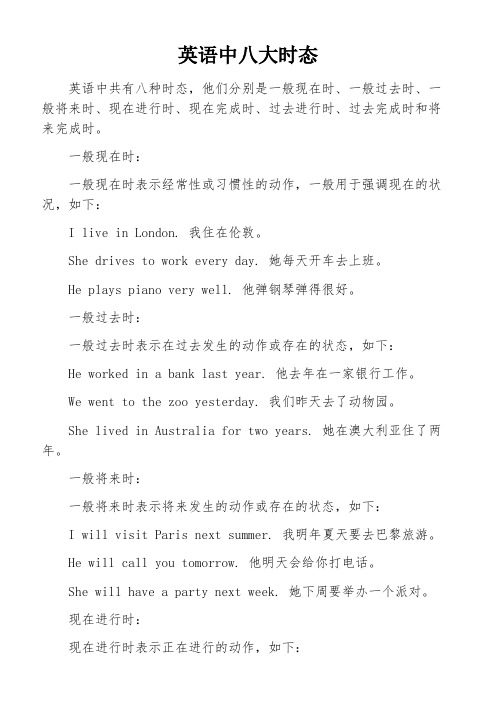
英语中八大时态英语中共有八种时态,他们分别是一般现在时、一般过去时、一般将来时、现在进行时、现在完成时、过去进行时、过去完成时和将来完成时。
一般现在时:一般现在时表示经常性或习惯性的动作,一般用于强调现在的状况,如下:I live in London. 我住在伦敦。
She drives to work every day. 她每天开车去上班。
He plays piano very well. 他弹钢琴弹得很好。
一般过去时:一般过去时表示在过去发生的动作或存在的状态,如下:He worked in a bank last year. 他去年在一家银行工作。
We went to the zoo yesterday. 我们昨天去了动物园。
She lived in Australia for two years. 她在澳大利亚住了两年。
一般将来时:一般将来时表示将来发生的动作或存在的状态,如下:I will visit Paris next summer. 我明年夏天要去巴黎旅游。
He will call you tomorrow. 他明天会给你打电话。
She will have a party next week. 她下周要举办一个派对。
现在进行时:现在进行时表示正在进行的动作,如下:They are watching TV now. 他们现在正在看电视。
He is playing tennis. 他正在打网球。
She is writing an email. 她正在写一封电子邮件。
现在完成时:现在完成时表示动作发生在过去,但对现在造成的影响仍然存在,如下:I have visited Paris. 我曾去过巴黎。
He has sent the package. 他已经寄出了包裹。
She has done her homework. 她已经做完了作业。
过去进行时:过去进行时表示过去正在发生的动作,如下:He was playing football yesterday. 他昨天正在踢足球。
英语中的16种时态(全)

英语中的16种时态(全)2.时间状语:tomorrow。
next week(year。
month…),soon。
in the future。
etc.3.基本结构:主语+will+动词原形4.否定形式:主语+will+not+动词原形5.一般疑问句:将will放于句首;用助动词do提问,同时还原行为动词。
6.例句:I XXX.我下周会去看望我的祖父母。
Will you come to the party with me tonight?今晚你会和我一起去参加聚会吗?四、现在进行时1.概念:表示现在正在进行的动作。
2.时间状语:now。
at present。
at the moment。
etc.3.基本结构:主语+am/is/are+动词的现在分词(-ing)4.否定形式:主语+am/is/are+not+动词的现在分词(-ing)5.一般疑问句:将be动词放于句首;用助动词do提问,同时还原行为动词。
6.例句:I am studying English right now.我正在研究英语。
XXX me?你在听我说话吗?五、过去进行时1.概念:表示过去某一时刻正在进行的动作。
2.时间状语:at that time。
at 8 o'clock yesterday evening。
etc.3.基本结构:主语+was/were+动词的现在分词(-ing)4.否定形式:主语+was/were+not+动词的现在分词(-ing)5.一般疑问句:将be动词放于句首;用助动词do的过去式did提问,同时还原行为动词。
6.例句:She was cooking XXX when I arrived home.我到家时她正在做晚饭。
Were you sleeping when I called you last night?昨晚我给你打电话时你在睡觉吗?六、将来进行时1.概念:表示将来某一时刻正在进行的动作。
2.时间状语:at this time next year。
英语中的16种时态(全)

动词16个时态一、一般现在时1.概念:表示经常发生的情况;有规律出现的情况;总是发生的;和事实真理。
2.时间状语:Always, usually, often, sometimes, every week (day, year, month…),once a week(day, year, month…),on Sundays(on Mondays …),3.基本结构:动词原形(如主语为第三人称单数,动词上要改为第三人称单数形式)4.否定形式:主语 + am/is/are + no t + 其他;此时态的谓语动词若为行为动词,则在其前加don't,如主语为第三人称单数,则用doesn't,同时还原行为动词。
5.一般疑问句:把be动词放于句首;用助动词do提问,如主语为第三人称单数,则用does,同时,还原行为动词。
6.例句:It seldom snows here.这里很少下雪。
He is always ready to help others.他总是乐于帮助别人。
Action speaks louder than words.事实胜于雄辩。
二、一般过去时1.概念:过去某个时间里发生的动作或状态;过去习惯性、经常性的动作、行为。
2.时间状语:ago, yesterday, the day before yesterday, last week, last(year, night, month…),in 1989,just now,at the age of 5,one day, long long ago, once upon a time, etc.3.基本结构:主语 + 动词的过去式或be的过去式+名词4.否定形式:主语 + was/were + not + 其他;在行为动词前加didn't,同时还原行为动词。
5.一般疑问句:was或were放于句首;用助动词do的过去式did 提问,同时还原行为动词。
英语各时态的标志词和句型

英语时态是英语语法中的重要部分,下面是英语各时态的标志词和句型介绍:1. 现在时态:现在时态通常表示当前发生的事情,标志词有now, today, always, frequently等。
句型为:主语+动词+其他成分(如宾语、状语等)。
例如:I eat apples every day.2. 过去时态:过去时态表示过去发生的事情,标志词有yesterday, last night, once upon a time等。
句型为:主语+动词的过去式+其他成分。
例如:I played football yesterday.3. 将来时态:将来时态表示将来发生的事情,标志词有will, tomorrow, next week等。
句型为:主语+will+动词原形+其他成分。
例如:It will rain tomorrow.4. 进行时态:进行时态表示正在进行的事情,标志词有be动词和动词ing 形式。
句型为:主语+be动词+动词ing形式+其他成分。
例如:She is singing a song now.5. 完成时态:完成时态表示已经完成的事情,标志词有have, had等。
句型为:主语+have/has+动词过去分词+其他成分。
例如:I have finished my homework.6. 完成进行时态:完成进行时态表示某个动作已经完成,并且这个动作是在过去一段时间内持续进行的。
标志词有have been, had been 等。
句型为:主语+have/has been+动词的现在分词+其他成分。
例如:I have been studying English for two years.7. 过去进行时态:过去进行时态表示在过去某个时间点正在进行的事情,标志词有was, were等。
句型为:主语+was/were+动词ing形式+其他成分。
例如:I was watching TV at 8:00 yesterday evening.8. 过去完成时态:过去完成时态表示在过去某个时间点之前已经完成的事情,标志词有had, had been等。
英语中的16种时态汇总讲解(附例句)

英语中的16种时态汇总讲解(附例句)1. 一般现在时(do/does; is/am/are)①现在的动作、情况、状态和特征。
例:She is a teacher.她是一位老师②经常性、习惯性动作。
例:He always helps others.他总是帮助别人。
③客观事实和普遍真理。
如果前后文不是一般现在时,则无法保持主句、从句时态一致。
例:The earth moves round the sun.地球绕着太阳转。
④表示一个按规定、计划或安排要发生的动作。
例:The next train leaves at 3 o'clock this afternoon.下一趟火车今天下午3点开车。
⑤在时间和条件状语从句里经常用一般现在(有时也用现在完成时)表示将来事情。
例:When you have finished the report, I will have waited for about 3 hours.等你完成这份报告的时候,我就已经等了将近3个小时了。
①表示此时此刻正在发生的事情。
例:He is listning to the music now.他现在正在听音乐。
②表示目前一段时间内一直在做的事情,但不一定此时此刻正在做。
例:I am studying computer this term.这个学期我一直在学习计算机。
③现在进行时可以表示将来的含义。
瞬时动词的进行一定表将来。
例:I am leaving.我要离开了。
持续动词的进行只有有将来的时间状语或有将来语境中才表将来。
例:I am travelling next month.下个月我要去旅行。
④现在进行时与频度副词连用,表示说话者或褒义或贬义的感情色彩。
例:He is always helping others.他总是帮助别人。
(褒义)①表示动作到现在为止已经完成或刚刚完成,强调对现在产生的影响。
例:I bought a new house, but I haven't sold my old one yet, so at the moment I have two houses.我买了一所新房子,但是还没有卖掉旧的,所以现在我又两所房子。
- 1、下载文档前请自行甄别文档内容的完整性,平台不提供额外的编辑、内容补充、找答案等附加服务。
- 2、"仅部分预览"的文档,不可在线预览部分如存在完整性等问题,可反馈申请退款(可完整预览的文档不适用该条件!)。
- 3、如文档侵犯您的权益,请联系客服反馈,我们会尽快为您处理(人工客服工作时间:9:00-18:30)。
八种时态一般现在时;1、构成;使用动词原形,第三人称单数须有变化。
(1)直接加“s”,works takes(2)以辅音加“y”结尾,变“y”为“i”,再加“es”carry――carries(3)以“o,s,ch,sh”结尾的动词加“es”goes dresses watches brushes2.功能;(1)表现在的事实,状态或动作;eg;Birds fly。
She loves musicMary…s paren ts get up very early(2)表示习惯动作或职业,常与often,sometimes,usually,always,every week,seldom,occasionally,frequently等时间副词连用。
eg;I always take a walk after supper。
She writes to me very oftenTom and his girlfriend go out to take apicnic occasionally。
(3表客观真理,格言警句或事实;The earth moves round the sun。
The sun rises in the east and sets in west。
Two and twomakes fomaMMur。
No man but errs。
人非圣贤,孰能无过。
(4表将来;A.在由when,after,befors,as,as soon as,although,because,if,even if,in case,till ,until,unless,so long as,where,whatever,wherever等引导的状语从句中用一般现在时表将来发生的动作。
(黄金重点,所有考试都不放过它!!!)例如I`ll tell her when she comes tomorrowEven if it rains this afternoon,I`ll meet you。
Whatever happens,you should keep cool-headed(不错的句型,背下!!!)I`ll be right here waiting for you wherever you go。
(很感人的句型!)B.按时间表示将要发生的动作或事件,用一般现在时表达将来时概念。
The play begins at 6;30 this evening。
When does the plane take off?He leaves for that city next week。
According to the timetable,the express train to Shanghai starts at nine in the morning(按照时刻表,开往上海的特快列车早上7点出发。
)现在进行时;is、am、are+现在分词二、表示现在正在进行的动作。
如The kettle is boiling。
Shall Imake ted?Don`t you think you eat too much?Y ou`re putting on weight(体重增加)。
The workers are building a new bridge across the river。
2、表现阶段正进行的动作。
He istaking physics this semester(本学期)。
We are preparing for our final examination this week。
3、go,come,leave,arrive,land,meet,die,start,return,join,etc。
用于进行时态时表示即将开始的动作。
Look!The bus is coming。
看!车来了!The old man is seriously ill,and he is dying。
Alice is leaving for Beijing with her mother。
4、与always,forever,continually,constantly等副词连用,表示说话人带有感情色彩;赞赏或厌恶。
He is always thinking of others(他总是想着别人。
)The boy is continually making noises(这男孩不断地发出吵闹声。
)The teacher is constantly (always)critizing her for being late(老师一直在批评她迟到。
)5、下面表示状态、感觉、情绪、精神活动的动词不可用于进行时。
此条戒律背10遍!!!)believe(相信)doubt(怀疑)see(看见)hear(听见)know(知道)understand (理解)belong(属于)think(认为)consider(认为)feel(觉得)look(看起来)seem (看上去)show(显示)mind(介意)have(有)sound(听起来)taste(尝起来)require (要求)possess(拥有)care(关心)like(喜欢)hate(讨厌)love(喜爱)detest (憎恨)desire(意欲)简单记忆永远不要说I`m believing。
或He is seeing a house。
再简单一点说,这些动词后面不要随意加—ing。
可怕的是;我们在写作及口语中常犯此类大错!注意;have a party|think about可以用进行时,因为这里have意为“举行”;think意为“考虑”三:一般过去时。
定义动词的过去试:1表示过去某个特定时间或一段时间发生的动作或情况。
We visited the school last spring。
I went to school by bike when I was in middle school。
China was rounded in 1949。
2、在表示时间或条件等的状语从句中代替过去将来时(参考)She told me that she would not go with us if it rained the next day。
They would not leave until she came back。
My fyiend promised to marry me once she made her final decision。
3、一般过去时,现在时和过去时的几组差异;(别以为很简单,下面的差异你不一定明白。
)Her brother was a chemist。
(已去世)Her brother is a chemist(尚健在)That`s all I had to say(话已说完)That`s all I have to say(言之未尽)It was so nice to see you(离别时用)It is so nice to see you(见面时用)Jane did a lot of work this morning(已是当天下午或晚上)Jane has done a lot of work this morning(仍是上午)四:过去进行时;were|was+现在分词1、表示过去某一时刻或阶段正在发生的动作。
I was playing chess at 8 yesterday evening。
When I arrived ,they were watching TV。
They were dong housework this time last week。
2、用于条件状语从句中表示过去将来进行的动作。
She told me to wake him up if she was sleeping。
I asked my friend to warn me about it as long as I was driving too fast3、过去某时将发生的事。
They told me that they were leaving for New Y ork。
He was going out when I arrived。
五:现在完成时;have|has+过去分词1表示过去所发生的动作对现在的影响或产生的结果。
常与yet,just,before,recently (最近)ever,never等表示时间的副词搭配使用。
He hasn`t seen her her lately。
I haven`t finished the book yet。
2、表示一个从过去某个时间开始,延续到现在并可能持续下去的动作,常与表示一段时间的时间状语连用。
如;so far(迄今为止),up till now(直到现在),since,for a long time (很长时间),up to present(直到现在),in the past|in the last few years(在过去的几年里),these days(目前)He has worked here for 15 years。
I have studied English since I came here。
The foreigner has been away from China a long time。
So far,I haven`t received a single letter from my brother。
3、某些非延续性动词(即;动作开始便终止的动词),在现在完成时中不能与表示一段时间状语搭配。
黄金要点;A、常见的非延续动词;die,arrive(到达),join(加入),leave(离开),go,refuse (拒绝),fail(失败),finish,buy,marry,divorce(离婚),awake(醒),buy,borrow,lend(全部会背)。
B、这类动词并非不能用现在完成时,而是不能按常由for引导的时间状语。
C、若是用在否定句中,非延续动词的现在完成时可以与表示一段时间的状语连用。
She has qone away for a month。
(误)She has been away for a month。
(正)The man has died for two years。
(误)The man has been dead for two years(正)How long have you bought the book?(误)How long have you qot the book,(正)4、注意since的用法;They haven`t had any trouble since they came here。
